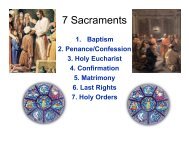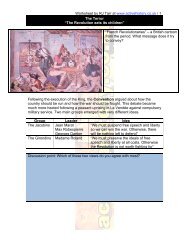What was the Renaissance? Why Did the Renaissance Begin in Italy?
What was the Renaissance? Why Did the Renaissance Begin in Italy?
What was the Renaissance? Why Did the Renaissance Begin in Italy?
Create successful ePaper yourself
Turn your PDF publications into a flip-book with our unique Google optimized e-Paper software.
<strong>What</strong> <strong>was</strong> <strong>the</strong> <strong>Renaissance</strong>? <strong>Why</strong> <strong>Did</strong><br />
<strong>the</strong> <strong>Renaissance</strong> <strong>Beg<strong>in</strong></strong> <strong>in</strong> <strong>Italy</strong>?
<strong>Renaissance</strong> 1350-1600 = Rebirth<br />
• Economic & Intellectual Revival <strong>in</strong> Europe
Roman Ru<strong>in</strong>s
Center of Trade with Asia<br />
• Venice and Genoa<br />
• Trade with Constant<strong>in</strong>ople and Asia<br />
• Asia Preserved works of <strong>the</strong> great Classical Th<strong>in</strong>kers<br />
• Inventions: better maps, astrolabe, magnetic compass, galleon<br />
• Peppercorns, nutmeg, mace, and c<strong>in</strong>namon all came from lands to <strong>the</strong><br />
east. Also from <strong>the</strong> east came precious gems and f<strong>in</strong>e silk, a fabric<br />
especially sought after for women's cloth<strong>in</strong>g.
Rise of <strong>the</strong> Towns and Cities<br />
Wealth shifts from Large Landowners<br />
(Farms) to Merchants
Rise of a Merchant Middle Class<br />
As <strong>the</strong> fortunes of merchants, bankers, and trades people improved, <strong>the</strong>y had more than<br />
enough money to meet <strong>the</strong>ir basic needs for food, cloth<strong>in</strong>g, and shelter. They began to<br />
desire larger, more luxurious homes, f<strong>in</strong>e art for <strong>the</strong>se residences, sumptuous cloth<strong>in</strong>g to<br />
show off <strong>the</strong>ir wealth <strong>in</strong> public, and exotic delicacies to eat. These desires of <strong>the</strong> middle<br />
class stimulated <strong>the</strong> economy.
Revival of Education<br />
• The middle-class population also had leisure time to spend on education and enterta<strong>in</strong>ment.<br />
In fact, education <strong>was</strong> essential for many middle-class professions. Bankers and<br />
accountants needed to understand arithmetic. Those trad<strong>in</strong>g with o<strong>the</strong>r countries needed a<br />
knowledge of foreign currencies and languages. Read<strong>in</strong>g <strong>was</strong> essential for anyone who<br />
needed to understand a contract
Economic Revival<br />
• Merchants are import<strong>in</strong>g from <strong>the</strong> east<br />
• More opportunities provided by banks and loans<br />
• Banks are needed for:<br />
• Provide (loans) credit<br />
• Transfer money between countries<br />
Gold Flor<strong>in</strong>
Humanism<br />
• An <strong>in</strong>terest <strong>in</strong> Greece and Rome<br />
• Seek fulfillment <strong>in</strong> Daily Life and <strong>in</strong> your Life on Earth<br />
• Each <strong>in</strong>dividual has dignity and worth.<br />
• You can improve your position <strong>in</strong> society and <strong>in</strong>fluence your future.<br />
• Encouraged <strong>in</strong>dependent th<strong>in</strong>k<strong>in</strong>g. Be critical and use logic.<br />
Humanists believed that wealth enabled <strong>the</strong>m to do f<strong>in</strong>e, noble deeds, that<br />
good citizens needed a good, well-rounded education (such as that<br />
advocated by <strong>the</strong> Greeks and Romans), and that moral and ethical issues<br />
were related more to secular society than to spiritual concerns.
Patrons of The Arts<br />
• Wealthy Humanist Merchants<br />
• To ease conscious as “s<strong>in</strong>ful<br />
bankers” merchants built<br />
churches and commissioned<br />
artists<br />
• Opened Schools<br />
• Lorenzo Medici adopted<br />
Michealangelo
Sou<strong>the</strong>rn <strong>Renaissance</strong><br />
• Strong pagan <strong>in</strong>fluence by Greek philosophers like Plato<br />
• Baldassare Castiglione (1478–1529), whose Book of <strong>the</strong><br />
Courtier affectionately summed up humanistic thought.
Nor<strong>the</strong>rn <strong>Renaissance</strong><br />
Christian Humanism<br />
“a philosophy advocat<strong>in</strong>g <strong>the</strong> selffulfillment<br />
of man with<strong>in</strong> <strong>the</strong><br />
framework of Christian pr<strong>in</strong>ciples.”<br />
More Conservative<br />
• More Medieval<br />
• More Religious<br />
• One of <strong>the</strong> greatest scholars of his<br />
time<br />
• Translated classic texts from Greek<br />
and Lat<strong>in</strong>.<br />
• Called for reform <strong>in</strong> <strong>the</strong> Church<br />
through his various satirical works.<br />
• A dedicated Christian who advocated<br />
reform with<strong>in</strong> <strong>the</strong> Church.<br />
Desiderius Erasmus


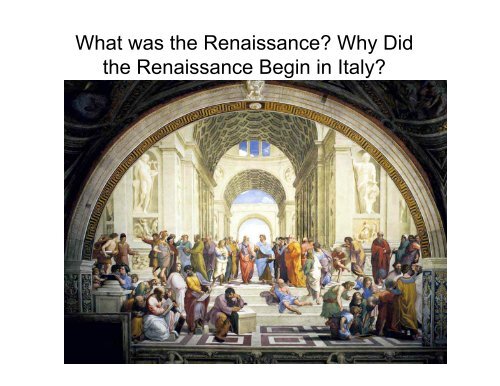
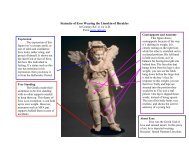
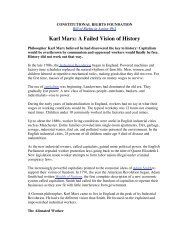
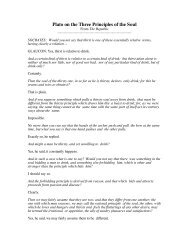
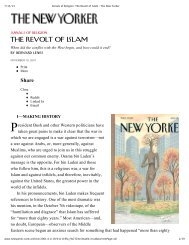
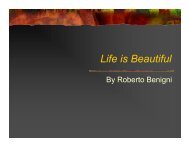
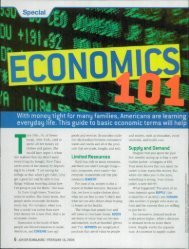
![the persian war.ppt [Read-Only] - WorldHistoryatYHS](https://img.yumpu.com/38254893/1/190x146/the-persian-warppt-read-only-worldhistoryatyhs.jpg?quality=85)
